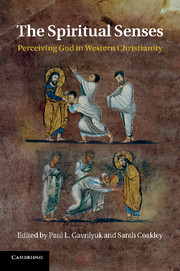Book contents
- Frontmatter
- Contents
- Contributors
- Foreword
- Abbreviations
- Introduction
- Chapter 1 Origen of Alexandria
- Chapter 2 Gregory of Nyssa
- Chapter 3 Augustine
- Chapter 4 Gregory the Great
- Chapter 5 Pseudo-Dionysius the Areopagite
- Chapter 6 Maximus the Confessor
- Chapter 7 Alexander of Hales
- Chapter 8 Thomas Gallus
- Chapter 9 Bonaventure
- Chapter 10 Thomas Aquinas
- Chapter 11 Late medieval mystics
- Chapter 12 Nicholas of Cusa
- Chapter 13 Jonathan Edwards and his Puritan predecessors
- Chapter 14 John Wesley
- Chapter 15 Karl Rahner and Hans Urs von Balthasar
- Chapter 16 Analytic philosophers of religion
- Select bibliography
- General index
- Index of select biblical references
- References
Chapter 7 - Alexander of Hales
Published online by Cambridge University Press: 05 December 2011
- Frontmatter
- Contents
- Contributors
- Foreword
- Abbreviations
- Introduction
- Chapter 1 Origen of Alexandria
- Chapter 2 Gregory of Nyssa
- Chapter 3 Augustine
- Chapter 4 Gregory the Great
- Chapter 5 Pseudo-Dionysius the Areopagite
- Chapter 6 Maximus the Confessor
- Chapter 7 Alexander of Hales
- Chapter 8 Thomas Gallus
- Chapter 9 Bonaventure
- Chapter 10 Thomas Aquinas
- Chapter 11 Late medieval mystics
- Chapter 12 Nicholas of Cusa
- Chapter 13 Jonathan Edwards and his Puritan predecessors
- Chapter 14 John Wesley
- Chapter 15 Karl Rahner and Hans Urs von Balthasar
- Chapter 16 Analytic philosophers of religion
- Select bibliography
- General index
- Index of select biblical references
- References
Summary
‘Do not touch me.’
Jesus to Mary MagdaleneTouch consummates knowledge.
AugustineIntroduction
Near the end of Proslogion, Anselm of Canterbury invoked the language of spiritual sensation to mourn the absence of the God whose existence, though perhaps proved certain, eluded his experience:
Still you are hidden, O Lord, from my soul…For it looks, and does not see your beauty. It listens, and does not hear your harmony. It smells, and does not perceive your fragrance. It tastes, and does not recognize your sweetness. It touches, and does not feel your pleasantness. For you have these attributes in yourself, Lord God, after your ineffable manner, who has given them to objects created by you, after their sensible manner; but the sinful senses of my soul have grown rigid and dull, and have been obstructed by their long listlessness.
As often with Anselm, his remark looks back to his patristic forebears, East and West. Seven centuries earlier, Augustine of Hippo had confessed an opposite experience, though in similar terms:
Yet there is a light I love, and a food, and a kind of embrace when I love my God – a light, voice, odour, food, embrace of my inner man, where my soul is floodlit by light which space cannot contain, where there is sound that time cannot seize, where there is a perfume which no breeze disperses, where there is a taste for food no amount of eating can lessen, and where there is a bond of union that no satiety can part.
Anselm's reference to the ‘senses of the soul’ also recalls the doctrine of the spiritual senses of the soul inaugurated in the east by Origen of Alexandria. Commenting on Leviticus 6: 3, conveyed to medievals by the Glossa ordinaria (at Lev 7: 5), Origen said:
The five physical senses are able to be redeemed, as they are converted to good acts, just as are the five interior senses: so that with a pure heart we may see God and hear what he says to us, and smell the good odour of Christ and taste him. Concerning which the Psalm says, taste and see that the Lord is good (Ps 34 [33]: 8); and we will touch with Saint John concerning the word of life (I Jn 1: 1).
After Origen, this teaching found varied expression in the East with Gregory of Nyssa, Pseudo-Dionysius and Maximus the Confessor.
- Type
- Chapter
- Information
- The Spiritual SensesPerceiving God in Western Christianity, pp. 121 - 139Publisher: Cambridge University PressPrint publication year: 2011
References
- 2
- Cited by



